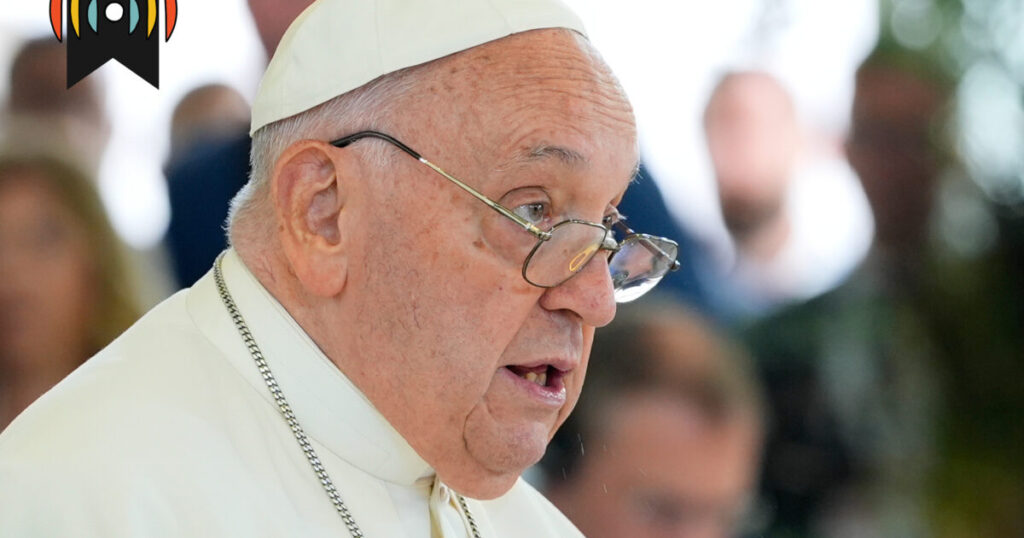LINDSAY MASTO, HOST: Our next episode of The World and Everything in It is “Christians and Artificial Intelligence.”
Pope Francis made the remarks last month at this year’s meeting of the G7, a group of seven nations that includes the United States, Japan, Canada and four Western European countries.
One of the issues the Pope mentioned was artificial intelligence, which he said should concern both the Church and the State.
Paul Butler, host: How should Christians across denominations engage with AI, and what are their leaders saying?
World Radio’s Mary Manthey reports.
Pope Francis: No technology is neutral, I repeat, no technology is neutral.
MARY MUNTHEY: Speaking through a translator, Pope Francis at the G7 summit warned leaders that artificial intelligence can be a wonderful tool, but it also has the potential to bring nations to their knees.
Pope Francis: To speak about technology means to speak about what it means to be human, the specific human condition between freedom and responsibility.
Pope Francis urged leaders not to see technological advances as a solution to the world’s problems or to pursue progress recklessly.
Pope Francis: It is the responsibility of each individual to make good use of it and the political responsibility to create the conditions in which this use is possible and fruitful.
Governments around the world are exploring how to regulate AI without stifling innovation, but the lack of a consistent moral framework has slowed progress in developing guidelines.
The G7’s current guidelines include promoting democratic safety and security and protecting human rights.
Some companies have begun to set up their own testing mechanisms to alleviate the need for government regulation.
But other companies are moving in the opposite direction: Industry leader OpenAI came under fire earlier this year for disbanding its committee on long-term safety, after its leaders resigned over irresponsible rapid development.
In response to the confusion, religious leaders such as Pope Francis are hoping to clarify the situation.
Jason Thacker: I think the Pope is right when he says that people of faith need to be involved in these conversations.
Jason Thacker, an assistant professor of philosophy and ethics at Boyce College, helped draft the Southern Baptist Convention’s statement last year.
Tucker: Christians especially have an opportunity to talk about the image of God, the question of human dignity, and how we see that in light of God’s world and God’s creation.
The SBC position statement acknowledges that the fall affects every part of humanity, including the technology we create, and that Christ has power over all of it.
The statement emphasizes that AI has unique power to shape our view of reality. Sometimes it’s small things, like algorithms that influence what you see first on social media or news sites, or the first answer you see when you ask Google a question. But AI can also have life-or-death consequences.
Thacker: When you think about war, war and international war, the use of drones, the use of cyber attacks, AI has an impact on human dignity. You start to realize that technology is shaping how we see things, how we love our neighbors, and even how we think about pursuing justice in a very broken world.
Statements from Pope Francis and the Southern Baptist Convention hold developers and governments accountable to ensure that humans still make human decisions, which raises the question: Why should humans make these decisions?
Trevor Sutton: For a long time, intelligence has been the defining characteristic of human beings.
Trevor Sutton is a Lutheran pastor and writer on Christianity and technology.
Sutton: Right now we’re looking at AI and its intelligence – artificial intelligence – and saying this is pretty smart. In fact, in some areas, this may be smarter than us.
Sutton says this mindset fuels fears about AI: These models can convey information, but they can’t empathize or offer wise advice.
This is one of the things the SBC statement addresses: AI doesn’t have a soul.
Sutton: If we look at Genesis 2, we see that being human is a creature created by God, that being human is intrinsically tied, in some sense, to having the God-given breath of life. So with that in mind, I think there’s a very compelling argument to be made that AI will never replace humans.
Sutton said it can help Christians strike a balance between optimism and pessimism about emerging technologies, so that people can embrace AI for things like automating repetitive tasks, while regulating its use for weapons or things that affect mental health.
Tucker agrees: There have been waves of promise for AI since the 1950s, but so far it hasn’t delivered any utopias or the end of the world, he says.
Thacker: We have hope. We know that Jesus is alive. We know that He is seated at the right hand of the Father and that death has been defeated. So we don’t have to blindly fear these technologies or pin our hopes on them.
Reporting from World, Mary Manthey.
WORLD Radio transcripts are produced to meet rush deadlines. This text may not be final and may be updated or revised over time. Accuracy and availability may vary. The official recording of a WORLD Radio show is the audio recording.

